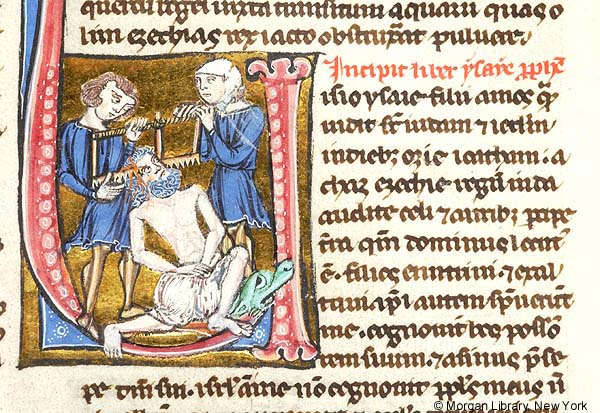Members-only podcast episode
The Ascension of Isaiah and the Second-Century Christian Esoteric

This is a special podcast episode for SHWEP members only
Already a member? Log in here to view this episode
In this episode we discuss a fascinating, early Christian (or Jewish-Christian) apocalypse, the Ascension of Isaiah. Probably assembled from two texts – an earlier, Jewish story of Isaiah’s prophetic mission, prophecies, and death, and a later, Christian account of Isaiah’s heavenly ascent in the company of an angelic guide, Isaiah’s own angelomorphic transformation, and visions of Christian eschatology – the Ascension provides fascinating data on very early Christian esotericism, the messianic hopes of the early church, and the tensions within that church between visionary, ecstatic encounters with the Spirit and the growing church hierarchy of priests and bishops. The text would go on to have a long life in esoteric Christian movements of the middle ages and later (and is still read by some Christians today), injecting ideas of visionary out-of-body journeying, antinomian enthusiasm, and angelomorphic transformation into later Christian communities, many of them esoteric movements widely condemned as heretical.
Works Cited in this Episode:
Primary:
We cite the translation of Knibb (2021); see Recommended Reading below.
- Peter killed by Nero: Tacitus (Annales 15.44, 2-9) tells how, when Nero was under pressure from the Roman populace who thought he had started the great fire of 64 CE, he diverted their ire through blaming the people known as ‘Chrestianos’ or ‘Christianos’ (manuscript issues with the spellings), and, incidentally, torturing them hideously. We do not know much more than this about the ‘Neronian persecution’. Incidentally, this passage from Tacitus is one of our first non-Christian recognitions that people called something like ‘Christians’ existed; cf. 1 Clem. 6.1-2, 5.4. The Ascension of Isaiah 4.3 implies that the apostle Peter perished in this persecution (or maybe Paul).
- Paul, 2 Corinthians 12:1-4: ‘I will come to visions and revelations of the Lord. 2 I knew a man in Christ above fourteen years ago, (whether in the body, I cannot tell; or whether out of the body, I cannot tell: God knoweth;) such an one caught up to the third heaven. 3 And I knew such a man, (whether in the body, or out of the body, I cannot tell: God knoweth;) 4 How that he was caught up into paradise, and heard unspeakable words, which it is not lawful for a man to utter.’
- ‘Thrones’ in contemporary angelologies: e.g. Colossians 1:16: ‘For by him were all things created, that are in heaven, and that are in earth, visible and invisible, whether they be thrones, or dominions, or principalities, or powers: all things were created by him, and for him’; TLevi 3:8.
Secondary:
- Knibb 2021 (see below), we cite p. 143.
- Knight 1995, see below.
- H.H. Rowley. The Relevance of Apocalyptic. Lutterworth Press, London, 1963; we cite pp. 124-5.
Recommended Reading:
The earlier English translation of Charles 1900 is superseded by Knibb in Charlesworth 2021 (originally 1985). For some good overview of 2nd-century Christianities generally, see e.g. Frend 1991, 35-48; Chadwick 1967, 23-31.
- P. Bettiolo, editor. Ascensio Isaiae. Number 7 in CChr.SA. Brepols, Turnhout, 1995.
- H. Chadwick. The Early Church. Penguin, Harmondsworth, 1967.
- R.H. Charles. The Ascension of Isaiah. A & C Black, London, 1900.
- Adela Yarbro Collins. Cosmology and Eschatology in Jewish and Christian Apocalypticism. Brill, Leiden/Boston/Koln, 1996.
- W. H. C. Frend. The Early Church: From the Beginnings to 461. SCM Press, London, 1991.
- Ithamar Gruenwald. Apocalyptic and Merkavah Mysticism. Number 90 in Ancient Judaism and Early Christianity. Brill, Leiden, 1980 [a survey of a lot of literature, but with some great things to say about the Ascension vis à vis ascent as a spiritual practice].
- Martha Himmelfarb. The Experience of the Visionary and Genre in the Ascension of Isaiah 6–11 and the Apocalypse of Paul. Semeia, 36:97–111, 1986.
- Idem. Ascent to Heaven in Jewish and Christian Apocalypses. Oxford University Press, Oxford and New York, 1993 [Foundational work on Abrahamic ascent in antiquity].
- Michael A. Knibb. Martyrdom and Ascension of Isaiah: A New Translation and Introduction. In J.H. Charlesworth, editor, The Old Testament Pseudepigrapha, Volume Two: Expansions of the “Old Testament” and Legends, Wisdom and Philosophical Literature, Prayers, Psalms and Odes, Fragments of Lost Judeo-Hellenistic Works, pages 143–76. Hendrickson, Peabody, MA, 2021.
- Jonathan Knight. The Ascension of Isaiah. Sheffield Academic, Sheffield, 1995 [A useful intro to the text. Takes the view that the Ascension is a single, unified work by a single author, and that its political content is in direct response to a persecution instituted by Pliny as governor of Bithynia; both positions might be correct, but they are not unanimously accepted by any means].
- Christopher Rowland. The Open Heaven: A Study of Apocalyptic in Judaism and Christianity. Crossroad, New York, 1982.
- E. Tisserant. Ascension d’Isaïe. Traduction de la version éthiopiennne avec les principales variantes des versions grecque, latine et slave. Letouzey et Ané, Paris, 1909.


Comments
Comments are open to SHWEP members only
Join now to comment
Already a member? Log in here